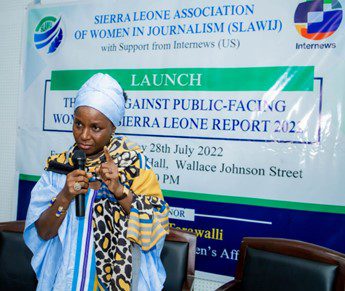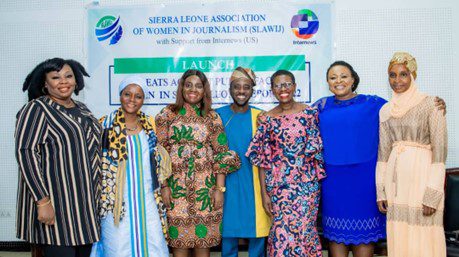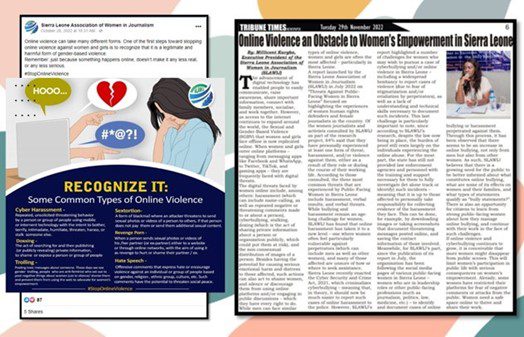
“It is time we start addressing these issues and not suffer in silence,” Naasu Fofanah said, alongside a panel of high-profile women and men in Sierra Leone on July 28th, 2022. These leaders gathered to share harrowing experiences of the harassment they faced or witnessed while serving in their public roles and spark a larger conversation about how to address the dangers women face on and offline.
Many women in the public eye in Sierra Leone (journalists, human rights activists, lawyers, CSO representatives) often face criticism from within their communities. However, as public-facing women, they face an increased risk of harassment, threats and intimidation, as well as targeted efforts to push them out of key public spaces, and censor/diminish their voices both online and offline. While these panelists were brave enough to share their experiences with the public, many attacks women face in the country go unreported. To better understand the scope of this issue and find ways to alleviate the problem, Internews developed the WIRED – Sierre Leone Project.
WIRED – Sierra Leone, launched in September 2021, has been working to advance women’s protection and political participation in the country. Funded by the U.S. Department of State’s Bureau of Democracy, Human Rights and Labor (DRL), the project combines Internews approaches toward gender equality in the media, technology and information spaces, Reflect Reality and Safe Sisters. Additionally, Internews’s partners on the ground assist research, legal and advocacy support, online threat tracking, and psycho-social training for public facing women and male allies supporting the work. The initiative has supported journalists to increase women’s expert voices and issues of relevance to women in news, strengthen women’s ability to protect themselves and their communities from online and offline attacks and facilitate cross-sectoral collaboration across civil society.

This panel event in June marked the launch of one of the key pieces of research from the project titled Threats Against Public-Facing Women in Sierra Leone. In partnership with Internews, the Sierra Leone Association of Women in Journalism (SLAWJ) conducted stakeholder mapping with various media and civil society organizations, as well as focus group discussions with local public facing women to analyze the situation. The report found that 64% of female respondents reported personally experiencing a threat as a Public Facing Woman. Primarily, harassment, verbal insults and verbal threats were their leading concerns.
The study also revealed the growing threats women face online. 62% of female CSO representatives and 50% female journalists reported being targets of cyber harassment. Both men and women are common perpetrators of online harassment, telling these public facing women to ‘go back to school’, ‘leave politics’ or commenting negatively on their physical appearance. Surprisingly, these attacks also come from other public facing women, responding to backlash they receive from the public. “They are now used to this… They are going to fight back for themselves because they don’t have the laws to protect themselves. They don’t have the right things in place, so they use their comment section to comment back.” Millicent Kargbo, SLAWIJ’s Executive President explains in an interview with Internews.

Alongside change on the individual level, SLAWIJ is spearheading initiatives to more broadly raise awareness on the issues by leading social media campaigns and using traditional media to raise awareness on the issues. Through the launch of this report and threat tracking activity, many media outlets have shown interest in covering this topic. “Many people were just learning about this issue and were interested to learn more…The part that’s more appreciated is that SLAWIJ is tracking this and introducing specific words to describe the comments that women receive every day on their platforms,” Kargbo explains. The report’s final chapter on Conclusions and Recommendations shows the additional steps policy necessary to support public facing women to continue carrying out their work both safely as securely. After the end of the project, Internews will continue to seek opportunities to further support partners working on this important issue in Sierra Leone.